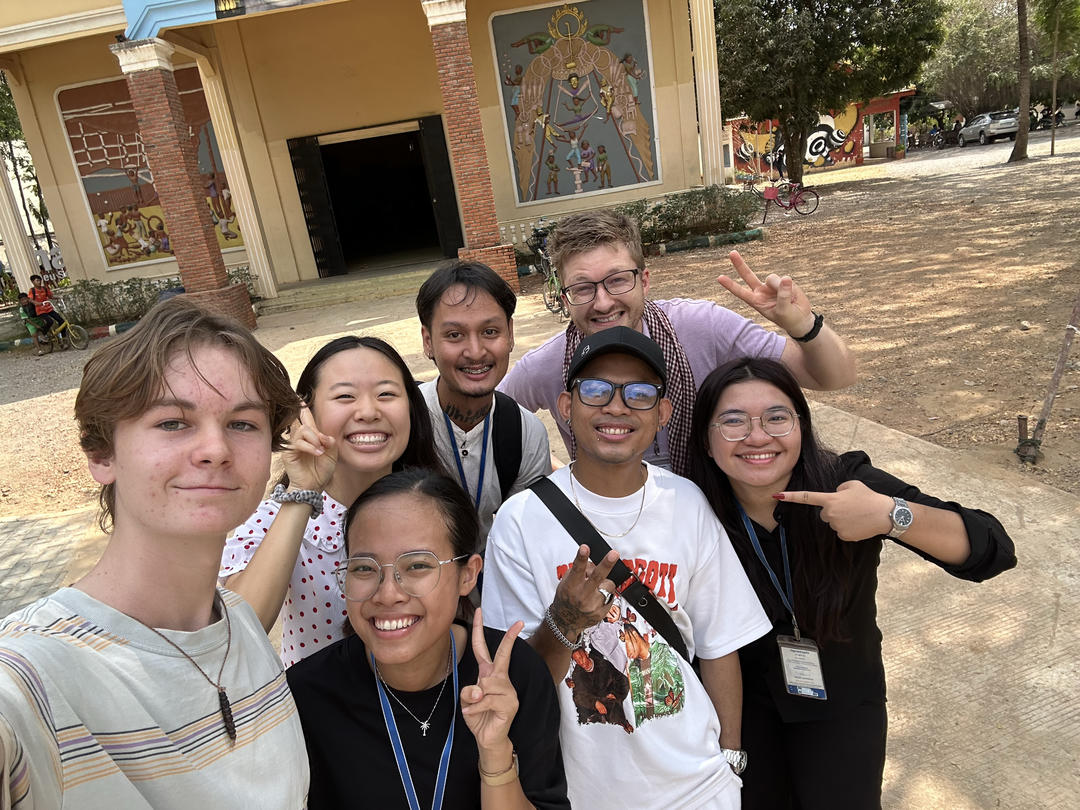The Art of Healing: Novogratz Bridge Year Cambodia participants delve into the restorative power of the arts

Story was originally published in the 2024 edition of Princeton University’s international magazine, Princeton Int'l.
Located in the bustling city of Battambang, Phare Ponleu Selpak is a Cambodian nonprofit that utilizes arts education as a means to heal the traumas of war and celebrate Cambodia’s rich cultural heritage. In the fall of 2023, Princeton’s innovative Novogratz Bridge Year Program — which provides incoming first-year students the chance to begin their Princeton journey with nine months of international community-engaged learning — expanded to six program locations, including Cambodia. Bridge Year participants learn with and from community partners like Phare by collaborating on projects that respond to community concerns while learning about Cambodia’s ongoing process of truth and reconciliation.
Between 1975 and 1979, the Khmer Rouge regime massacred almost one-fourth of Cambodia’s population. Those atrocities, as well as the wars that followed, forced hundreds of thousands into refugee camps in neighboring countries.
The idea of Phare Ponleu Selpak, which translates into “the brightness of the arts,” began in 1986 in a Thai refugee camp called “Site II” where French humanitarian Véronique Decrop conducted art therapy classes for children. In 1994, Decrop and a group of her most dedicated students returned to Battambang, where they formally founded Phare. Phare has since become a major artistic and cultural hub, supporting more than 1,000 low-income students each year in a range of performing, visual and applied arts programs while offering free primary education and social services.
“Arts and culture bring the joy, sharing and love to a community” said Osman Khawaja, executive director of Phare. “With all that was lost during the Khmer Rouge, Cambodia is still rebuilding its cultural identity and integrating arts into daily lives.”
Bridge Year Cambodia participant Eliot Witherspoon ’28, who collaborated with Phare’s communications team to produce content for their website and social media channels, said that an art installation at Phare’s 30th anniversary gala gave him an eye-opening “glimpse into the first art classes taught at Site II.” He said, “seeing these pictures [of violence and trauma] drawn by such young people is heartbreaking. But you can also see how getting the memories of these experiences out onto paper could and did feel very liberating,” and added, “the backstory of Phare taught me the value of working through trauma and opened my eyes to the use of artistic expression as a means to do that.”
Over the years, Phare began teaching traditional Khmer musical instruments and traditional dances — a practice stigmatized and suppressed by the Khmer Rouge — to rebuild community and cultural identity for young Cambodians.
“The children and youth not only played a part in preserving arts and culture, but they also deepened their sense of belonging to their community after having been raised in a refugee camp, isolated from many cultural elements,” said Khawaja. “Despite the traumatic pasts, even at times having been on opposing sides of the war, the shared cultural heritage helped them forgive and heal.”
“I loved that Phare was so interactive with the community,” said Soree Kim ’28 who also worked with Phare’s communications team during the past year. She noted that events and festivals attracted “not only Battambang citizens but also those from other provinces and countries.” One program, the Phare Battambang Circus, offers weekly performances by students and is considered one of the city’s top attractions.
“Phare is the life force of the arts in Battambang,” said Witherspoon. “And the city is all the better for it.”
Kim, who helped coordinate special events such as Phare’s Sangker River Run, a fundraiser to mark its 30th anniversary, said: “Phare was one of the most influential factors in my Bridge Year experience. It taught me that passion is nothing without hard work.” She added that the experience also revealed to her an affinity for working with communities.
“Phare showed me that peace and reconciliation are a constant effort,” said Kim. “War may last years, but reconciliation takes decades.”
